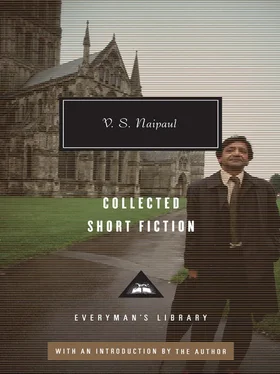My establishment could not rival Hori’s or Kedar’s for splendour, but within it there was peace and culture such as I had long dreamed of. It was a plain wooden house, but well built, built to last, unlike so many of these modern monstrosities which I see arising these days: and it was well ordered. We had simple bentwood chairs with cane bottoms. No marble-topped tables with ball-fringed lace! No glass cabinets! I hung my treasured framed teaching diploma on the wall, with my religious pictures and some scenes of the English countryside. It was also my good fortune at this time to get an old autographed photograph of one of our first missionaries. In the decoration of our humble home my wife appeared to release all the energy and experience of her thirty-five years which had so far been denied expression.
To her, as to myself, everything came late. It was our fear, confirmed by the views of many friends who behind their expressions of goodwill concealed as we presently saw much uncharitableness, that we would be unable to have children, considering our advanced years. But they, and we, underestimated the power of prayer, for within a year of our marriage Winston was born.
The birth of Winston came to us as a grace and a blessing. Yet it also filled me with anxiety, for I could not refrain from assessing the difference between our ages. It occurred to me, for instance, that he would be thirty when I was eighty. It was a disturbing thought, for the companionship of children is something which, perhaps because of my profession, I hold especially dear. My anxiety had another reason. It was that Winston, in his most formative years, would be without not only my guidance — for what guidance can a man of seventy give to a lusty youngster of twenty? — but also without my financial support.
The problem of money, strange as it might appear, considering my unexpected elevation and all its accruing benefits, was occupying the minds of both my wife and myself. For my retirement was drawing near, and my pension would scarcely be more than what I subsisted on as a simple pupil teacher. It seemed then that like those pilgrims, whose enthusiasm I admire but cannot share, I was advancing towards my goal by taking two steps forward and one step back, though in my case a likelier simile might be that I was taking one step forward and one step back. So success always turns to ashes in the mouth of those who seek it as ardently as I had! And if I had the vision and the depth of faith which I now have, I might have seen even then how completely false are the things of this world, how much they flatter only to deceive.
We were both, as I say, made restless. And now the contemplation of baby Winston was a source of much pain to both of us, for the poor innocent creature could scarcely know what anguish awaited him when we would both be withdrawn from this vale of tears. His helplessness, his dependence tortured me. I was past the age when the taking out of an insurance policy was a practicable proposition; and during my days as a simple teacher I never had the resources to do so. It seemed, then, that I was being destroyed by my own good fortune, by the fruits of all my endeavour. Yet I did not heed this sign.
I continued while I could giving private lessons. I instituted a morning session as well, in addition to the afternoon one. But I did so with a heavy heart, tormented by the thought that in a few years this privilege and its small reward would be denied me, for private lessons, it must be understood, are considered the prerogative of a headmaster: in this way he stamps his character on the school. My results in the exhibition examinations for boys under twelve continued to be heartening; they far surpassed those of many other country schools. My religious zeal continued unabated; and it was this zeal which, burning in those years when most men in my position would have relaxed — they, fortunate souls, having their children fully grown — it was this surprising zeal, I say, which also contributed, I feel, to my later elevation which, as you will see from the plain narration of these events, I did not seek.
My retirement drew nearer. I became fiercer at school. I wished all the boys under me could grow up at once. I was merciless towards the backward. My wife, poor creature, could not control her anxiety with as much success as myself. She had no occupation, no distracting vocation, in which her anxiety might have been consumed. She had only Winston, and this dear infant continually roused her to fears about his future. For his sake she would, I believe, have sacrificed her own life! It was not easy for her. And it required but the exercise of the mildest Christian charity to see that the reproaches she flung with increased acerbity and frequency at my head were but expressions of her anxiety. Sometimes, I must confess, I failed! And then my own unworthiness would torment me, as it torments me now.
We confided our problems to my wife’s father, the schools inspector. Though we felt it unfair to let another partake of our troubles, it is none the less a recognized means of lightening any load which the individual finds too heavy to bear. But he, poor man, though as worried on his daughter’s behalf as she was on Winston’s, could offer only sympathy and little practical help. He reported that the authorities were unwilling to give me an extension of my tenure as headmaster. My despondency found expression in a display of temper, which he charitably forgave; for though he left the house, promising not to do another thing for us, he presently returned, and counselled patience.
So patient we were. I retired. I could hardly bear to remain at home, so used had I been to the daily round, the daily trials. I went out visiting, for no other reason than that I was afraid to be alone at home. My zeal, I believe, was remarked upon, though I took care to avoid the school, the scene of my late labours. I sought to take in for private lessons two or three pupils whose progress had deeply interested me. But my methods were no longer the methods that found favour! The parents of these children reported that the new headmaster had expressed himself strongly, and to my great disfavour, on the subject, to such a degree, in fact, that the progress of their children at school was being hampered. So I desisted; or rather, since the time has come for frankness, they left me.
The schools inspector, a regular visitor now at our humble, sad home, continued to counsel patience. I have so far refrained in this narrative from permitting my wife to speak directly; for I wish to do nothing that might increase the load she will surely have to bear, for my wife, though of considerable attainments, has not had the advantages of a formal education on which so much stress is nowadays laid. So I will refrain from chronicling the remark with which she greeted this advice of her father’s. Suffice it to say that she spoke a children’s rhyme without any great care for its metre or rhyme, the last of which indeed she destroyed by accidentally, in her haste, pulling down a vase from the centre-table on to the floor, where the water ran like one of the puddles which our baby Winston so lately made. After this incident relations between my wife and her father underwent a perceptible strain; and I took care to be out of the house as often as possible, and indeed it was pleasant to forget one’s domestic troubles and walk abroad and be greeted as ‘Headmaster’ by the simple village folk.
Then, as it appears has happened so regularly throughout my life, the clouds rolled away and the sky brightened. I was appointed a School Manager. The announcement was made in the most heart-warming way possible, by the schools inspector himself, anticipating the official notification by a week or so. And the occasion became a family reunion. It was truly good to see the harassed schools inspector relaxing at last, and to see father and daughter reasonably happy with one another. My delight in this was almost as great as the delight in my new dignity.
Читать дальше









